Relationship between Culture, Politics, Power and Motivation in Organisational Behaviour
VerifiedAdded on 2023/01/17
|16
|4847
|75
AI Summary
This report explores the relationship between culture, politics, power and motivation in organisational behaviour. It discusses the critical evaluation of these factors and their influence on individual and team behaviour. The report also covers content theories and process theories of motivation, with a case study of Aldi.
Contribute Materials
Your contribution can guide someone’s learning journey. Share your
documents today.
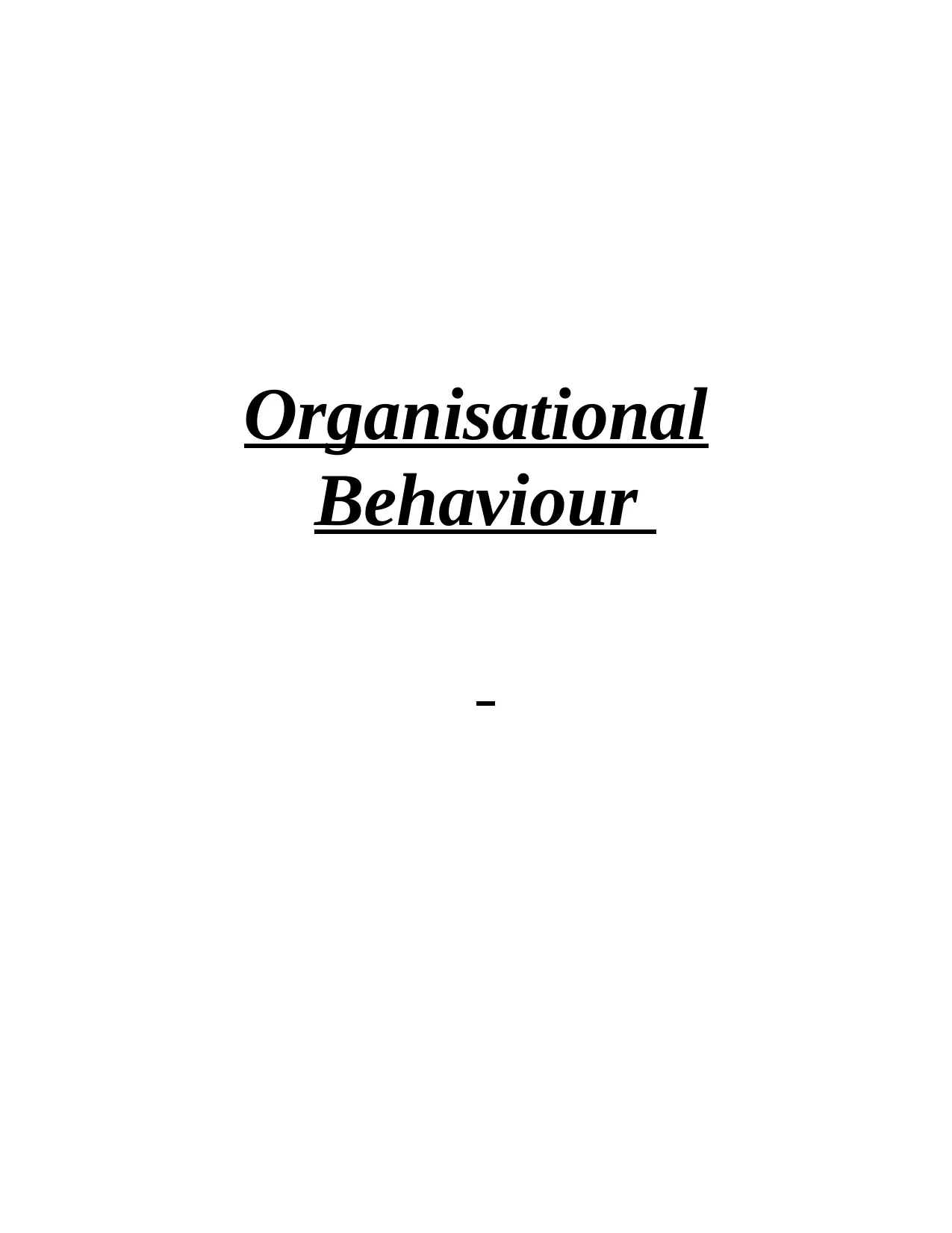
Organisational
Behaviour
Behaviour
Secure Best Marks with AI Grader
Need help grading? Try our AI Grader for instant feedback on your assignments.
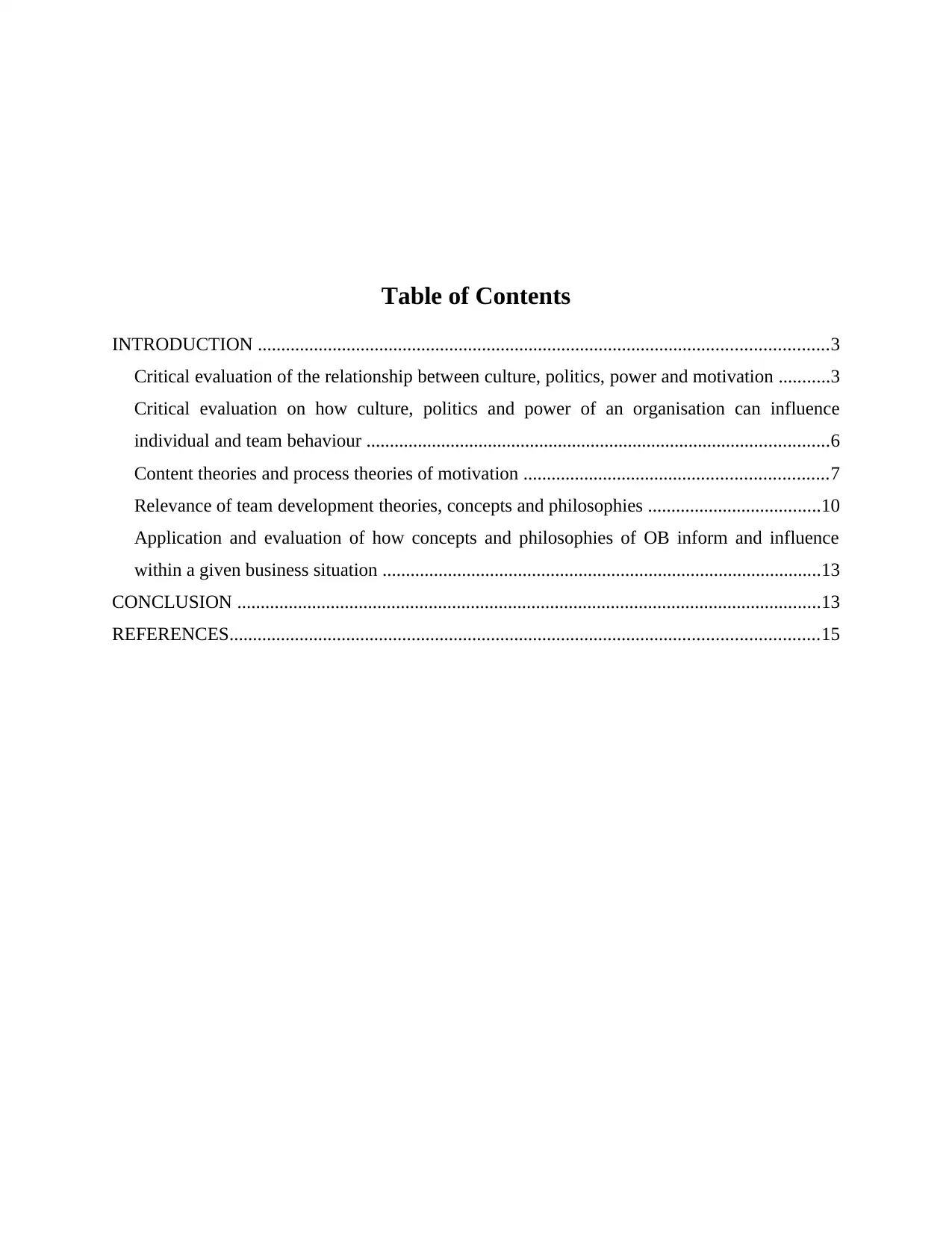
Table of Contents
INTRODUCTION ..........................................................................................................................3
Critical evaluation of the relationship between culture, politics, power and motivation ...........3
Critical evaluation on how culture, politics and power of an organisation can influence
individual and team behaviour ...................................................................................................6
Content theories and process theories of motivation .................................................................7
Relevance of team development theories, concepts and philosophies .....................................10
Application and evaluation of how concepts and philosophies of OB inform and influence
within a given business situation ..............................................................................................13
CONCLUSION .............................................................................................................................13
REFERENCES..............................................................................................................................15
INTRODUCTION ..........................................................................................................................3
Critical evaluation of the relationship between culture, politics, power and motivation ...........3
Critical evaluation on how culture, politics and power of an organisation can influence
individual and team behaviour ...................................................................................................6
Content theories and process theories of motivation .................................................................7
Relevance of team development theories, concepts and philosophies .....................................10
Application and evaluation of how concepts and philosophies of OB inform and influence
within a given business situation ..............................................................................................13
CONCLUSION .............................................................................................................................13
REFERENCES..............................................................................................................................15
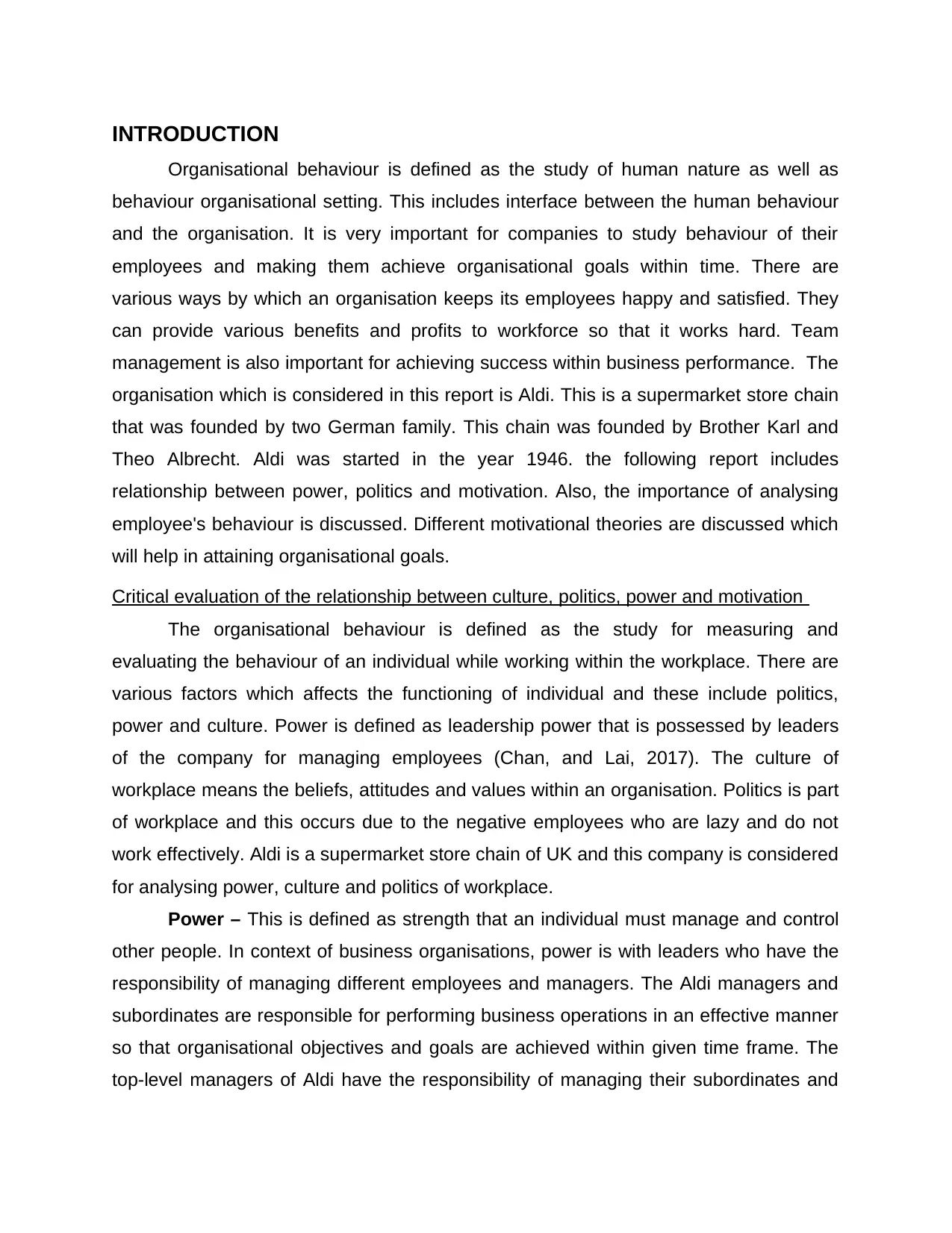
INTRODUCTION
Organisational behaviour is defined as the study of human nature as well as
behaviour organisational setting. This includes interface between the human behaviour
and the organisation. It is very important for companies to study behaviour of their
employees and making them achieve organisational goals within time. There are
various ways by which an organisation keeps its employees happy and satisfied. They
can provide various benefits and profits to workforce so that it works hard. Team
management is also important for achieving success within business performance. The
organisation which is considered in this report is Aldi. This is a supermarket store chain
that was founded by two German family. This chain was founded by Brother Karl and
Theo Albrecht. Aldi was started in the year 1946. the following report includes
relationship between power, politics and motivation. Also, the importance of analysing
employee's behaviour is discussed. Different motivational theories are discussed which
will help in attaining organisational goals.
Critical evaluation of the relationship between culture, politics, power and motivation
The organisational behaviour is defined as the study for measuring and
evaluating the behaviour of an individual while working within the workplace. There are
various factors which affects the functioning of individual and these include politics,
power and culture. Power is defined as leadership power that is possessed by leaders
of the company for managing employees (Chan, and Lai, 2017). The culture of
workplace means the beliefs, attitudes and values within an organisation. Politics is part
of workplace and this occurs due to the negative employees who are lazy and do not
work effectively. Aldi is a supermarket store chain of UK and this company is considered
for analysing power, culture and politics of workplace.
Power – This is defined as strength that an individual must manage and control
other people. In context of business organisations, power is with leaders who have the
responsibility of managing different employees and managers. The Aldi managers and
subordinates are responsible for performing business operations in an effective manner
so that organisational objectives and goals are achieved within given time frame. The
top-level managers of Aldi have the responsibility of managing their subordinates and
Organisational behaviour is defined as the study of human nature as well as
behaviour organisational setting. This includes interface between the human behaviour
and the organisation. It is very important for companies to study behaviour of their
employees and making them achieve organisational goals within time. There are
various ways by which an organisation keeps its employees happy and satisfied. They
can provide various benefits and profits to workforce so that it works hard. Team
management is also important for achieving success within business performance. The
organisation which is considered in this report is Aldi. This is a supermarket store chain
that was founded by two German family. This chain was founded by Brother Karl and
Theo Albrecht. Aldi was started in the year 1946. the following report includes
relationship between power, politics and motivation. Also, the importance of analysing
employee's behaviour is discussed. Different motivational theories are discussed which
will help in attaining organisational goals.
Critical evaluation of the relationship between culture, politics, power and motivation
The organisational behaviour is defined as the study for measuring and
evaluating the behaviour of an individual while working within the workplace. There are
various factors which affects the functioning of individual and these include politics,
power and culture. Power is defined as leadership power that is possessed by leaders
of the company for managing employees (Chan, and Lai, 2017). The culture of
workplace means the beliefs, attitudes and values within an organisation. Politics is part
of workplace and this occurs due to the negative employees who are lazy and do not
work effectively. Aldi is a supermarket store chain of UK and this company is considered
for analysing power, culture and politics of workplace.
Power – This is defined as strength that an individual must manage and control
other people. In context of business organisations, power is with leaders who have the
responsibility of managing different employees and managers. The Aldi managers and
subordinates are responsible for performing business operations in an effective manner
so that organisational objectives and goals are achieved within given time frame. The
top-level managers of Aldi have the responsibility of managing their subordinates and
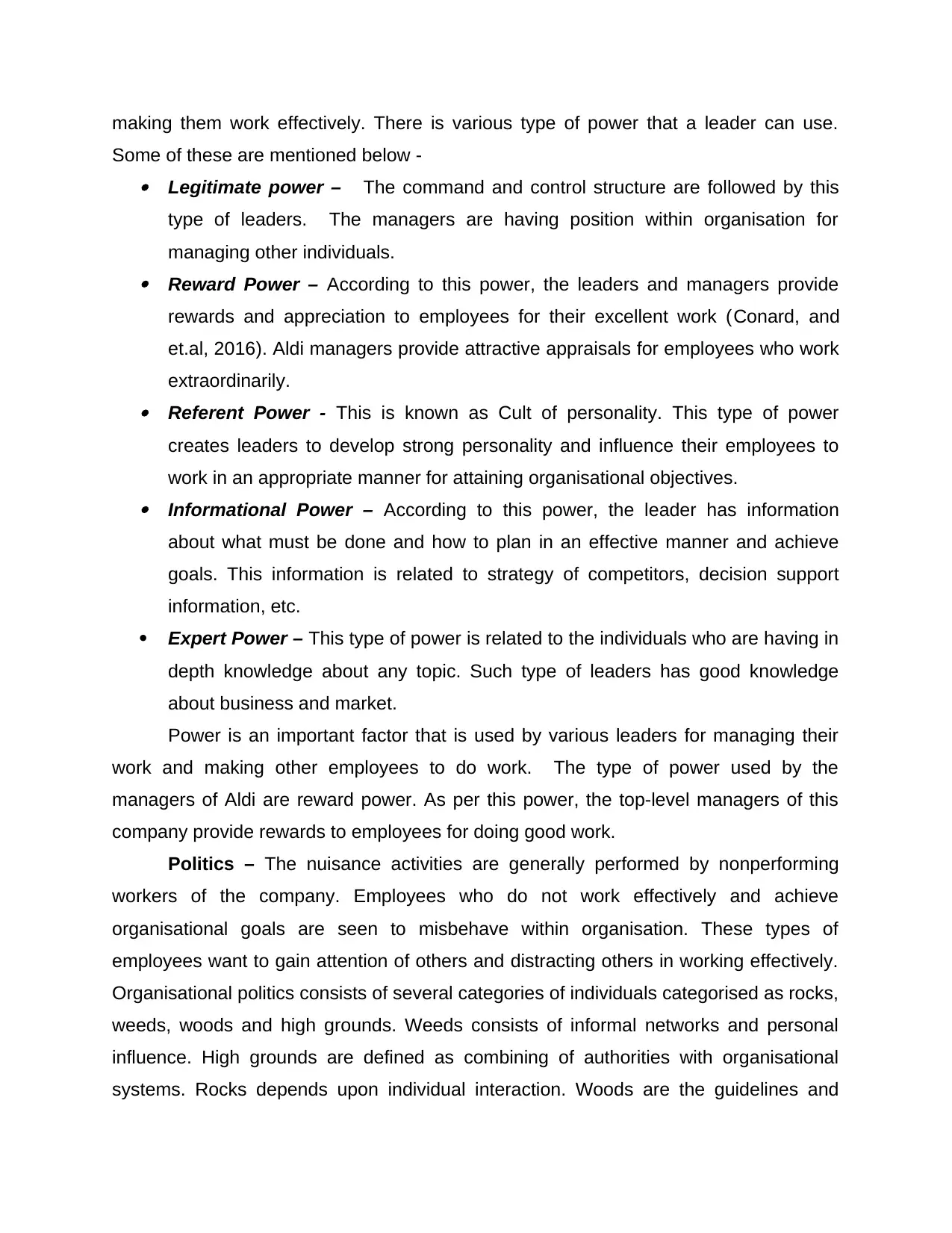
making them work effectively. There is various type of power that a leader can use.
Some of these are mentioned below - Legitimate power – The command and control structure are followed by this
type of leaders. The managers are having position within organisation for
managing other individuals. Reward Power – According to this power, the leaders and managers provide
rewards and appreciation to employees for their excellent work (Conard, and
et.al, 2016). Aldi managers provide attractive appraisals for employees who work
extraordinarily. Referent Power - This is known as Cult of personality. This type of power
creates leaders to develop strong personality and influence their employees to
work in an appropriate manner for attaining organisational objectives. Informational Power – According to this power, the leader has information
about what must be done and how to plan in an effective manner and achieve
goals. This information is related to strategy of competitors, decision support
information, etc.
Expert Power – This type of power is related to the individuals who are having in
depth knowledge about any topic. Such type of leaders has good knowledge
about business and market.
Power is an important factor that is used by various leaders for managing their
work and making other employees to do work. The type of power used by the
managers of Aldi are reward power. As per this power, the top-level managers of this
company provide rewards to employees for doing good work.
Politics – The nuisance activities are generally performed by nonperforming
workers of the company. Employees who do not work effectively and achieve
organisational goals are seen to misbehave within organisation. These types of
employees want to gain attention of others and distracting others in working effectively.
Organisational politics consists of several categories of individuals categorised as rocks,
weeds, woods and high grounds. Weeds consists of informal networks and personal
influence. High grounds are defined as combining of authorities with organisational
systems. Rocks depends upon individual interaction. Woods are the guidelines and
Some of these are mentioned below - Legitimate power – The command and control structure are followed by this
type of leaders. The managers are having position within organisation for
managing other individuals. Reward Power – According to this power, the leaders and managers provide
rewards and appreciation to employees for their excellent work (Conard, and
et.al, 2016). Aldi managers provide attractive appraisals for employees who work
extraordinarily. Referent Power - This is known as Cult of personality. This type of power
creates leaders to develop strong personality and influence their employees to
work in an appropriate manner for attaining organisational objectives. Informational Power – According to this power, the leader has information
about what must be done and how to plan in an effective manner and achieve
goals. This information is related to strategy of competitors, decision support
information, etc.
Expert Power – This type of power is related to the individuals who are having in
depth knowledge about any topic. Such type of leaders has good knowledge
about business and market.
Power is an important factor that is used by various leaders for managing their
work and making other employees to do work. The type of power used by the
managers of Aldi are reward power. As per this power, the top-level managers of this
company provide rewards to employees for doing good work.
Politics – The nuisance activities are generally performed by nonperforming
workers of the company. Employees who do not work effectively and achieve
organisational goals are seen to misbehave within organisation. These types of
employees want to gain attention of others and distracting others in working effectively.
Organisational politics consists of several categories of individuals categorised as rocks,
weeds, woods and high grounds. Weeds consists of informal networks and personal
influence. High grounds are defined as combining of authorities with organisational
systems. Rocks depends upon individual interaction. Woods are the guidelines and
Secure Best Marks with AI Grader
Need help grading? Try our AI Grader for instant feedback on your assignments.
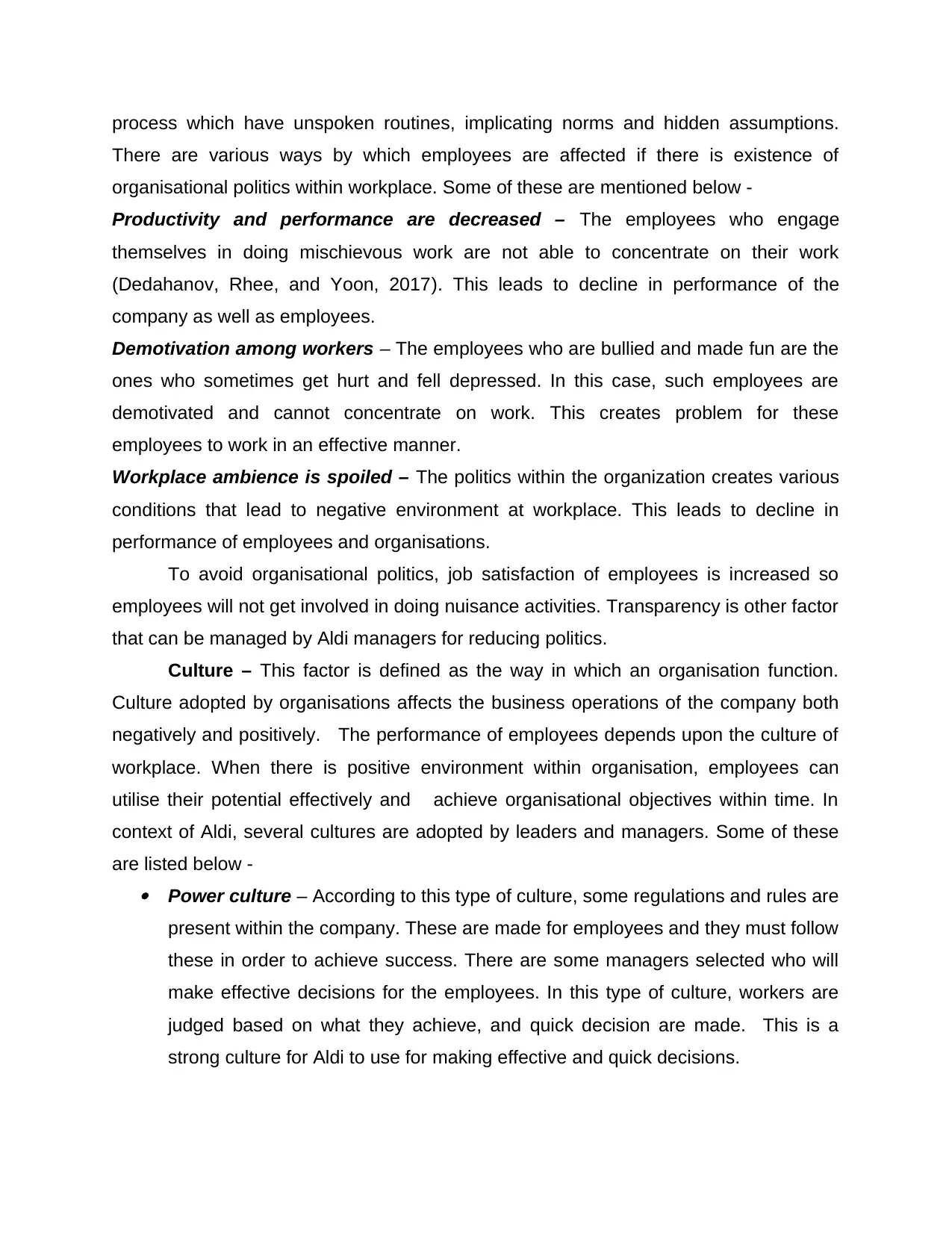
process which have unspoken routines, implicating norms and hidden assumptions.
There are various ways by which employees are affected if there is existence of
organisational politics within workplace. Some of these are mentioned below -
Productivity and performance are decreased – The employees who engage
themselves in doing mischievous work are not able to concentrate on their work
(Dedahanov, Rhee, and Yoon, 2017). This leads to decline in performance of the
company as well as employees.
Demotivation among workers – The employees who are bullied and made fun are the
ones who sometimes get hurt and fell depressed. In this case, such employees are
demotivated and cannot concentrate on work. This creates problem for these
employees to work in an effective manner.
Workplace ambience is spoiled – The politics within the organization creates various
conditions that lead to negative environment at workplace. This leads to decline in
performance of employees and organisations.
To avoid organisational politics, job satisfaction of employees is increased so
employees will not get involved in doing nuisance activities. Transparency is other factor
that can be managed by Aldi managers for reducing politics.
Culture – This factor is defined as the way in which an organisation function.
Culture adopted by organisations affects the business operations of the company both
negatively and positively. The performance of employees depends upon the culture of
workplace. When there is positive environment within organisation, employees can
utilise their potential effectively and achieve organisational objectives within time. In
context of Aldi, several cultures are adopted by leaders and managers. Some of these
are listed below - Power culture – According to this type of culture, some regulations and rules are
present within the company. These are made for employees and they must follow
these in order to achieve success. There are some managers selected who will
make effective decisions for the employees. In this type of culture, workers are
judged based on what they achieve, and quick decision are made. This is a
strong culture for Aldi to use for making effective and quick decisions.
There are various ways by which employees are affected if there is existence of
organisational politics within workplace. Some of these are mentioned below -
Productivity and performance are decreased – The employees who engage
themselves in doing mischievous work are not able to concentrate on their work
(Dedahanov, Rhee, and Yoon, 2017). This leads to decline in performance of the
company as well as employees.
Demotivation among workers – The employees who are bullied and made fun are the
ones who sometimes get hurt and fell depressed. In this case, such employees are
demotivated and cannot concentrate on work. This creates problem for these
employees to work in an effective manner.
Workplace ambience is spoiled – The politics within the organization creates various
conditions that lead to negative environment at workplace. This leads to decline in
performance of employees and organisations.
To avoid organisational politics, job satisfaction of employees is increased so
employees will not get involved in doing nuisance activities. Transparency is other factor
that can be managed by Aldi managers for reducing politics.
Culture – This factor is defined as the way in which an organisation function.
Culture adopted by organisations affects the business operations of the company both
negatively and positively. The performance of employees depends upon the culture of
workplace. When there is positive environment within organisation, employees can
utilise their potential effectively and achieve organisational objectives within time. In
context of Aldi, several cultures are adopted by leaders and managers. Some of these
are listed below - Power culture – According to this type of culture, some regulations and rules are
present within the company. These are made for employees and they must follow
these in order to achieve success. There are some managers selected who will
make effective decisions for the employees. In this type of culture, workers are
judged based on what they achieve, and quick decision are made. This is a
strong culture for Aldi to use for making effective and quick decisions.
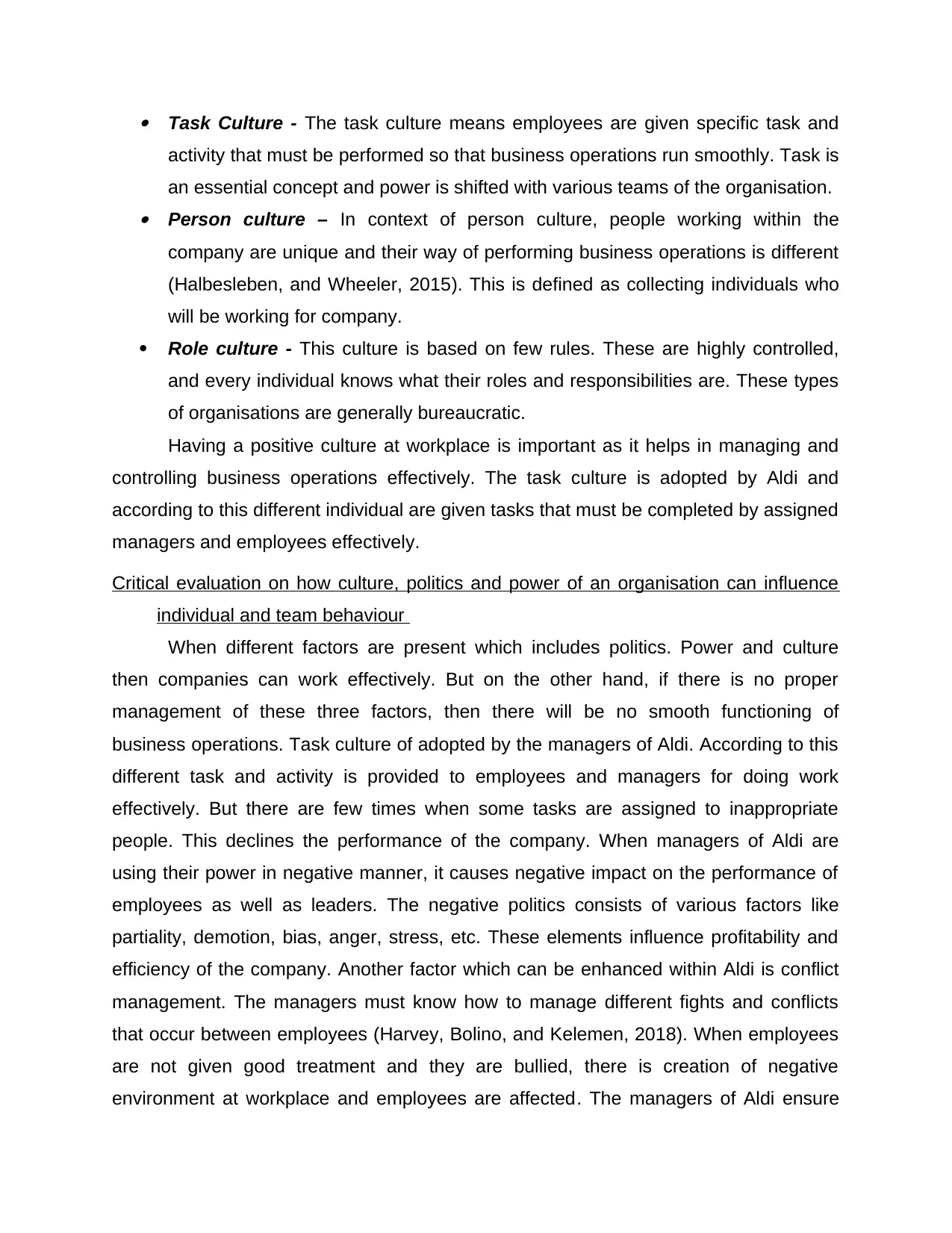
Task Culture - The task culture means employees are given specific task and
activity that must be performed so that business operations run smoothly. Task is
an essential concept and power is shifted with various teams of the organisation. Person culture – In context of person culture, people working within the
company are unique and their way of performing business operations is different
(Halbesleben, and Wheeler, 2015). This is defined as collecting individuals who
will be working for company.
Role culture - This culture is based on few rules. These are highly controlled,
and every individual knows what their roles and responsibilities are. These types
of organisations are generally bureaucratic.
Having a positive culture at workplace is important as it helps in managing and
controlling business operations effectively. The task culture is adopted by Aldi and
according to this different individual are given tasks that must be completed by assigned
managers and employees effectively.
Critical evaluation on how culture, politics and power of an organisation can influence
individual and team behaviour
When different factors are present which includes politics. Power and culture
then companies can work effectively. But on the other hand, if there is no proper
management of these three factors, then there will be no smooth functioning of
business operations. Task culture of adopted by the managers of Aldi. According to this
different task and activity is provided to employees and managers for doing work
effectively. But there are few times when some tasks are assigned to inappropriate
people. This declines the performance of the company. When managers of Aldi are
using their power in negative manner, it causes negative impact on the performance of
employees as well as leaders. The negative politics consists of various factors like
partiality, demotion, bias, anger, stress, etc. These elements influence profitability and
efficiency of the company. Another factor which can be enhanced within Aldi is conflict
management. The managers must know how to manage different fights and conflicts
that occur between employees (Harvey, Bolino, and Kelemen, 2018). When employees
are not given good treatment and they are bullied, there is creation of negative
environment at workplace and employees are affected. The managers of Aldi ensure
activity that must be performed so that business operations run smoothly. Task is
an essential concept and power is shifted with various teams of the organisation. Person culture – In context of person culture, people working within the
company are unique and their way of performing business operations is different
(Halbesleben, and Wheeler, 2015). This is defined as collecting individuals who
will be working for company.
Role culture - This culture is based on few rules. These are highly controlled,
and every individual knows what their roles and responsibilities are. These types
of organisations are generally bureaucratic.
Having a positive culture at workplace is important as it helps in managing and
controlling business operations effectively. The task culture is adopted by Aldi and
according to this different individual are given tasks that must be completed by assigned
managers and employees effectively.
Critical evaluation on how culture, politics and power of an organisation can influence
individual and team behaviour
When different factors are present which includes politics. Power and culture
then companies can work effectively. But on the other hand, if there is no proper
management of these three factors, then there will be no smooth functioning of
business operations. Task culture of adopted by the managers of Aldi. According to this
different task and activity is provided to employees and managers for doing work
effectively. But there are few times when some tasks are assigned to inappropriate
people. This declines the performance of the company. When managers of Aldi are
using their power in negative manner, it causes negative impact on the performance of
employees as well as leaders. The negative politics consists of various factors like
partiality, demotion, bias, anger, stress, etc. These elements influence profitability and
efficiency of the company. Another factor which can be enhanced within Aldi is conflict
management. The managers must know how to manage different fights and conflicts
that occur between employees (Harvey, Bolino, and Kelemen, 2018). When employees
are not given good treatment and they are bullied, there is creation of negative
environment at workplace and employees are affected. The managers of Aldi ensure
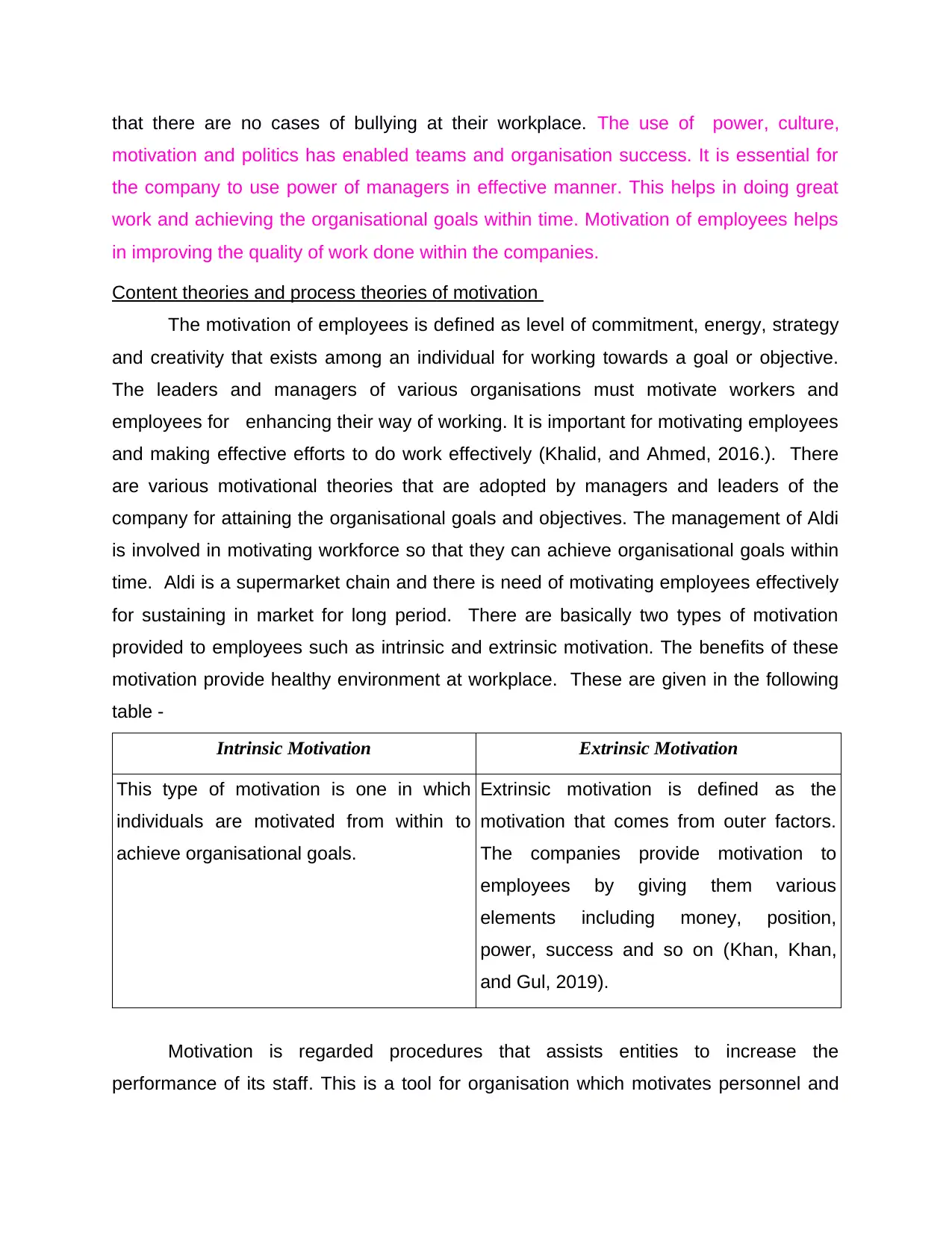
that there are no cases of bullying at their workplace. The use of power, culture,
motivation and politics has enabled teams and organisation success. It is essential for
the company to use power of managers in effective manner. This helps in doing great
work and achieving the organisational goals within time. Motivation of employees helps
in improving the quality of work done within the companies.
Content theories and process theories of motivation
The motivation of employees is defined as level of commitment, energy, strategy
and creativity that exists among an individual for working towards a goal or objective.
The leaders and managers of various organisations must motivate workers and
employees for enhancing their way of working. It is important for motivating employees
and making effective efforts to do work effectively (Khalid, and Ahmed, 2016.). There
are various motivational theories that are adopted by managers and leaders of the
company for attaining the organisational goals and objectives. The management of Aldi
is involved in motivating workforce so that they can achieve organisational goals within
time. Aldi is a supermarket chain and there is need of motivating employees effectively
for sustaining in market for long period. There are basically two types of motivation
provided to employees such as intrinsic and extrinsic motivation. The benefits of these
motivation provide healthy environment at workplace. These are given in the following
table -
Intrinsic Motivation Extrinsic Motivation
This type of motivation is one in which
individuals are motivated from within to
achieve organisational goals.
Extrinsic motivation is defined as the
motivation that comes from outer factors.
The companies provide motivation to
employees by giving them various
elements including money, position,
power, success and so on (Khan, Khan,
and Gul, 2019).
Motivation is regarded procedures that assists entities to increase the
performance of its staff. This is a tool for organisation which motivates personnel and
motivation and politics has enabled teams and organisation success. It is essential for
the company to use power of managers in effective manner. This helps in doing great
work and achieving the organisational goals within time. Motivation of employees helps
in improving the quality of work done within the companies.
Content theories and process theories of motivation
The motivation of employees is defined as level of commitment, energy, strategy
and creativity that exists among an individual for working towards a goal or objective.
The leaders and managers of various organisations must motivate workers and
employees for enhancing their way of working. It is important for motivating employees
and making effective efforts to do work effectively (Khalid, and Ahmed, 2016.). There
are various motivational theories that are adopted by managers and leaders of the
company for attaining the organisational goals and objectives. The management of Aldi
is involved in motivating workforce so that they can achieve organisational goals within
time. Aldi is a supermarket chain and there is need of motivating employees effectively
for sustaining in market for long period. There are basically two types of motivation
provided to employees such as intrinsic and extrinsic motivation. The benefits of these
motivation provide healthy environment at workplace. These are given in the following
table -
Intrinsic Motivation Extrinsic Motivation
This type of motivation is one in which
individuals are motivated from within to
achieve organisational goals.
Extrinsic motivation is defined as the
motivation that comes from outer factors.
The companies provide motivation to
employees by giving them various
elements including money, position,
power, success and so on (Khan, Khan,
and Gul, 2019).
Motivation is regarded procedures that assists entities to increase the
performance of its staff. This is a tool for organisation which motivates personnel and
Paraphrase This Document
Need a fresh take? Get an instant paraphrase of this document with our AI Paraphraser
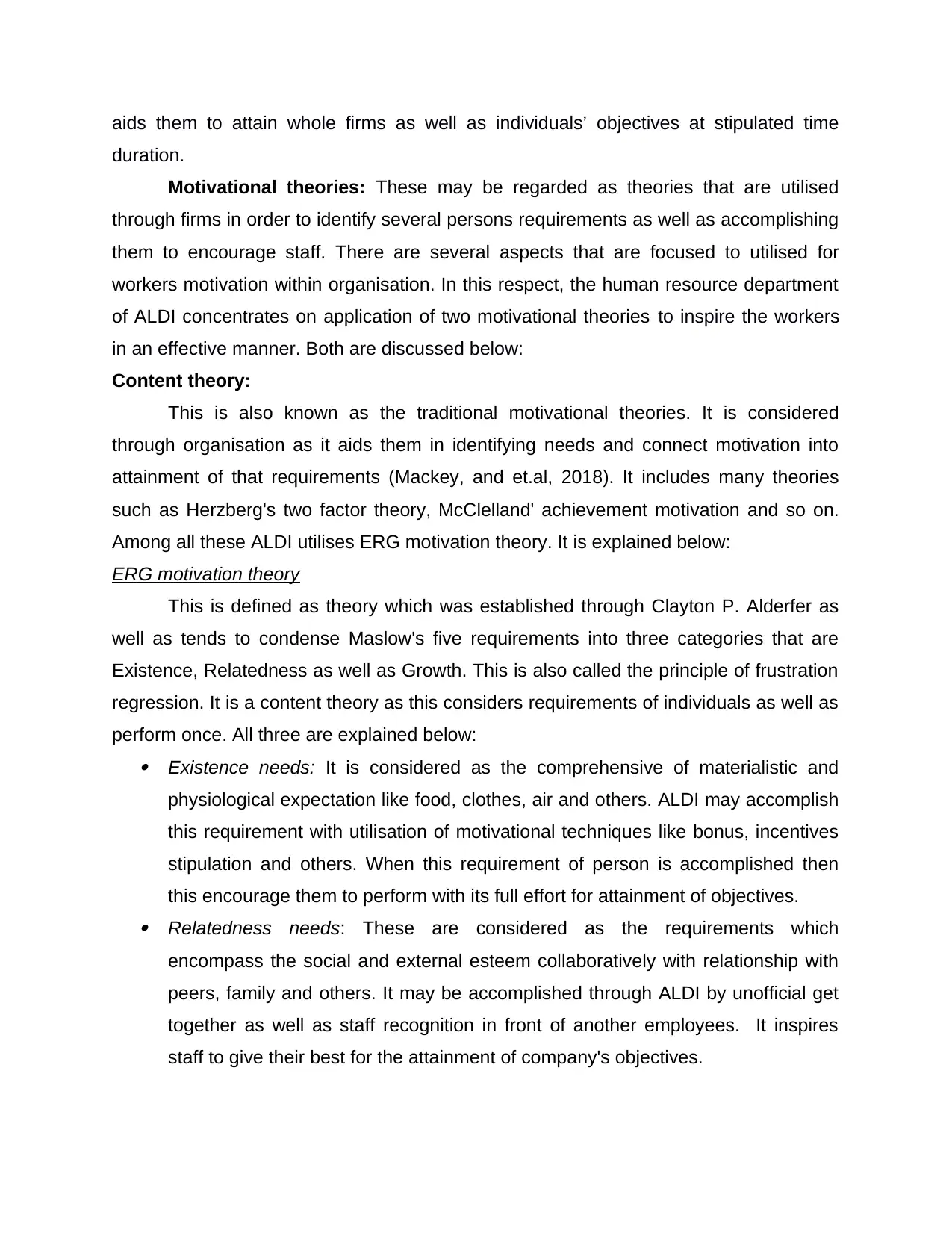
aids them to attain whole firms as well as individuals’ objectives at stipulated time
duration.
Motivational theories: These may be regarded as theories that are utilised
through firms in order to identify several persons requirements as well as accomplishing
them to encourage staff. There are several aspects that are focused to utilised for
workers motivation within organisation. In this respect, the human resource department
of ALDI concentrates on application of two motivational theories to inspire the workers
in an effective manner. Both are discussed below:
Content theory:
This is also known as the traditional motivational theories. It is considered
through organisation as it aids them in identifying needs and connect motivation into
attainment of that requirements (Mackey, and et.al, 2018). It includes many theories
such as Herzberg's two factor theory, McClelland' achievement motivation and so on.
Among all these ALDI utilises ERG motivation theory. It is explained below:
ERG motivation theory
This is defined as theory which was established through Clayton P. Alderfer as
well as tends to condense Maslow's five requirements into three categories that are
Existence, Relatedness as well as Growth. This is also called the principle of frustration
regression. It is a content theory as this considers requirements of individuals as well as
perform once. All three are explained below: Existence needs: It is considered as the comprehensive of materialistic and
physiological expectation like food, clothes, air and others. ALDI may accomplish
this requirement with utilisation of motivational techniques like bonus, incentives
stipulation and others. When this requirement of person is accomplished then
this encourage them to perform with its full effort for attainment of objectives. Relatedness needs: These are considered as the requirements which
encompass the social and external esteem collaboratively with relationship with
peers, family and others. It may be accomplished through ALDI by unofficial get
together as well as staff recognition in front of another employees. It inspires
staff to give their best for the attainment of company's objectives.
duration.
Motivational theories: These may be regarded as theories that are utilised
through firms in order to identify several persons requirements as well as accomplishing
them to encourage staff. There are several aspects that are focused to utilised for
workers motivation within organisation. In this respect, the human resource department
of ALDI concentrates on application of two motivational theories to inspire the workers
in an effective manner. Both are discussed below:
Content theory:
This is also known as the traditional motivational theories. It is considered
through organisation as it aids them in identifying needs and connect motivation into
attainment of that requirements (Mackey, and et.al, 2018). It includes many theories
such as Herzberg's two factor theory, McClelland' achievement motivation and so on.
Among all these ALDI utilises ERG motivation theory. It is explained below:
ERG motivation theory
This is defined as theory which was established through Clayton P. Alderfer as
well as tends to condense Maslow's five requirements into three categories that are
Existence, Relatedness as well as Growth. This is also called the principle of frustration
regression. It is a content theory as this considers requirements of individuals as well as
perform once. All three are explained below: Existence needs: It is considered as the comprehensive of materialistic and
physiological expectation like food, clothes, air and others. ALDI may accomplish
this requirement with utilisation of motivational techniques like bonus, incentives
stipulation and others. When this requirement of person is accomplished then
this encourage them to perform with its full effort for attainment of objectives. Relatedness needs: These are considered as the requirements which
encompass the social and external esteem collaboratively with relationship with
peers, family and others. It may be accomplished through ALDI by unofficial get
together as well as staff recognition in front of another employees. It inspires
staff to give their best for the attainment of company's objectives.
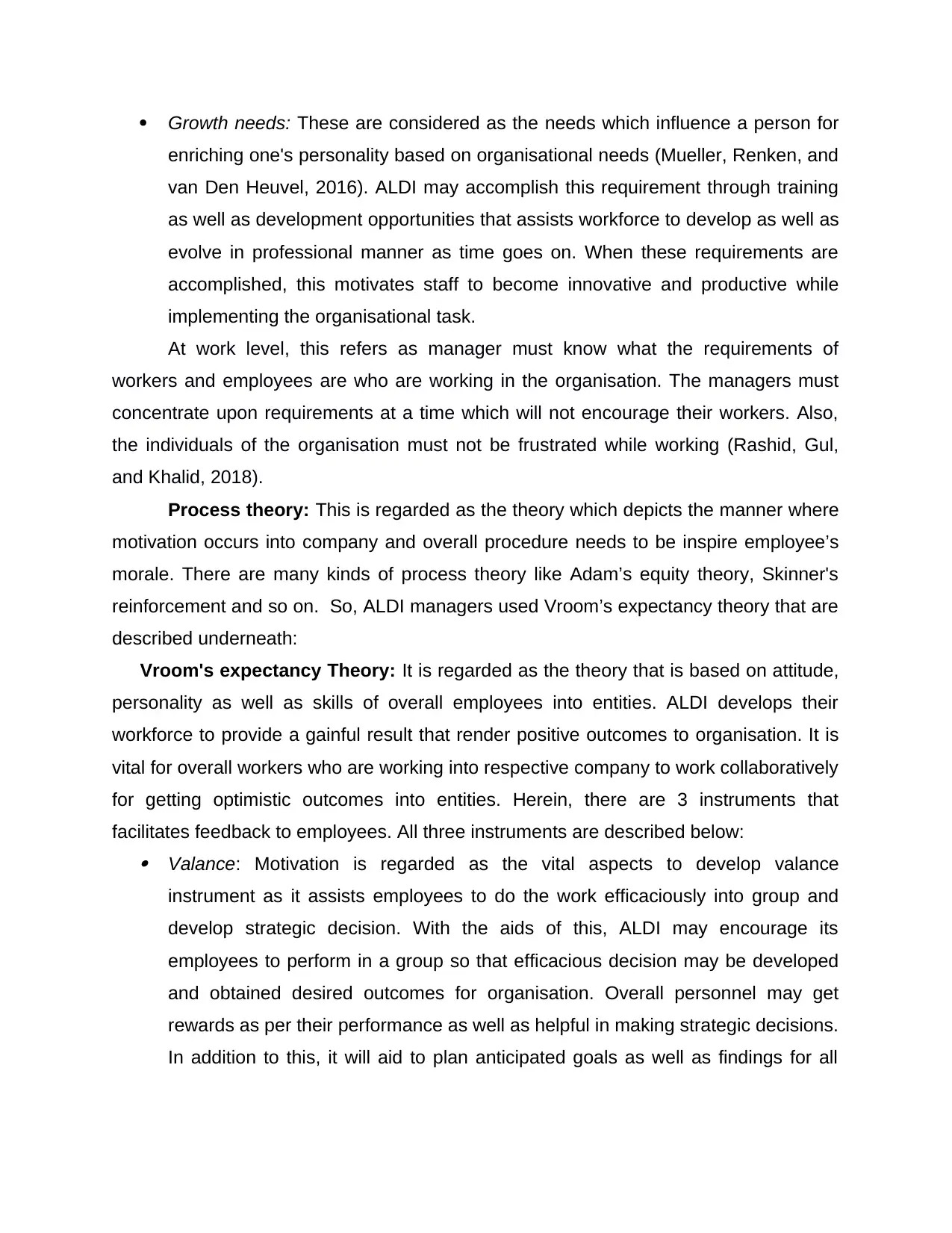
Growth needs: These are considered as the needs which influence a person for
enriching one's personality based on organisational needs (Mueller, Renken, and
van Den Heuvel, 2016). ALDI may accomplish this requirement through training
as well as development opportunities that assists workforce to develop as well as
evolve in professional manner as time goes on. When these requirements are
accomplished, this motivates staff to become innovative and productive while
implementing the organisational task.
At work level, this refers as manager must know what the requirements of
workers and employees are who are working in the organisation. The managers must
concentrate upon requirements at a time which will not encourage their workers. Also,
the individuals of the organisation must not be frustrated while working (Rashid, Gul,
and Khalid, 2018).
Process theory: This is regarded as the theory which depicts the manner where
motivation occurs into company and overall procedure needs to be inspire employee’s
morale. There are many kinds of process theory like Adam’s equity theory, Skinner's
reinforcement and so on. So, ALDI managers used Vroom’s expectancy theory that are
described underneath:
Vroom's expectancy Theory: It is regarded as the theory that is based on attitude,
personality as well as skills of overall employees into entities. ALDI develops their
workforce to provide a gainful result that render positive outcomes to organisation. It is
vital for overall workers who are working into respective company to work collaboratively
for getting optimistic outcomes into entities. Herein, there are 3 instruments that
facilitates feedback to employees. All three instruments are described below: Valance: Motivation is regarded as the vital aspects to develop valance
instrument as it assists employees to do the work efficaciously into group and
develop strategic decision. With the aids of this, ALDI may encourage its
employees to perform in a group so that efficacious decision may be developed
and obtained desired outcomes for organisation. Overall personnel may get
rewards as per their performance as well as helpful in making strategic decisions.
In addition to this, it will aid to plan anticipated goals as well as findings for all
enriching one's personality based on organisational needs (Mueller, Renken, and
van Den Heuvel, 2016). ALDI may accomplish this requirement through training
as well as development opportunities that assists workforce to develop as well as
evolve in professional manner as time goes on. When these requirements are
accomplished, this motivates staff to become innovative and productive while
implementing the organisational task.
At work level, this refers as manager must know what the requirements of
workers and employees are who are working in the organisation. The managers must
concentrate upon requirements at a time which will not encourage their workers. Also,
the individuals of the organisation must not be frustrated while working (Rashid, Gul,
and Khalid, 2018).
Process theory: This is regarded as the theory which depicts the manner where
motivation occurs into company and overall procedure needs to be inspire employee’s
morale. There are many kinds of process theory like Adam’s equity theory, Skinner's
reinforcement and so on. So, ALDI managers used Vroom’s expectancy theory that are
described underneath:
Vroom's expectancy Theory: It is regarded as the theory that is based on attitude,
personality as well as skills of overall employees into entities. ALDI develops their
workforce to provide a gainful result that render positive outcomes to organisation. It is
vital for overall workers who are working into respective company to work collaboratively
for getting optimistic outcomes into entities. Herein, there are 3 instruments that
facilitates feedback to employees. All three instruments are described below: Valance: Motivation is regarded as the vital aspects to develop valance
instrument as it assists employees to do the work efficaciously into group and
develop strategic decision. With the aids of this, ALDI may encourage its
employees to perform in a group so that efficacious decision may be developed
and obtained desired outcomes for organisation. Overall personnel may get
rewards as per their performance as well as helpful in making strategic decisions.
In addition to this, it will aid to plan anticipated goals as well as findings for all
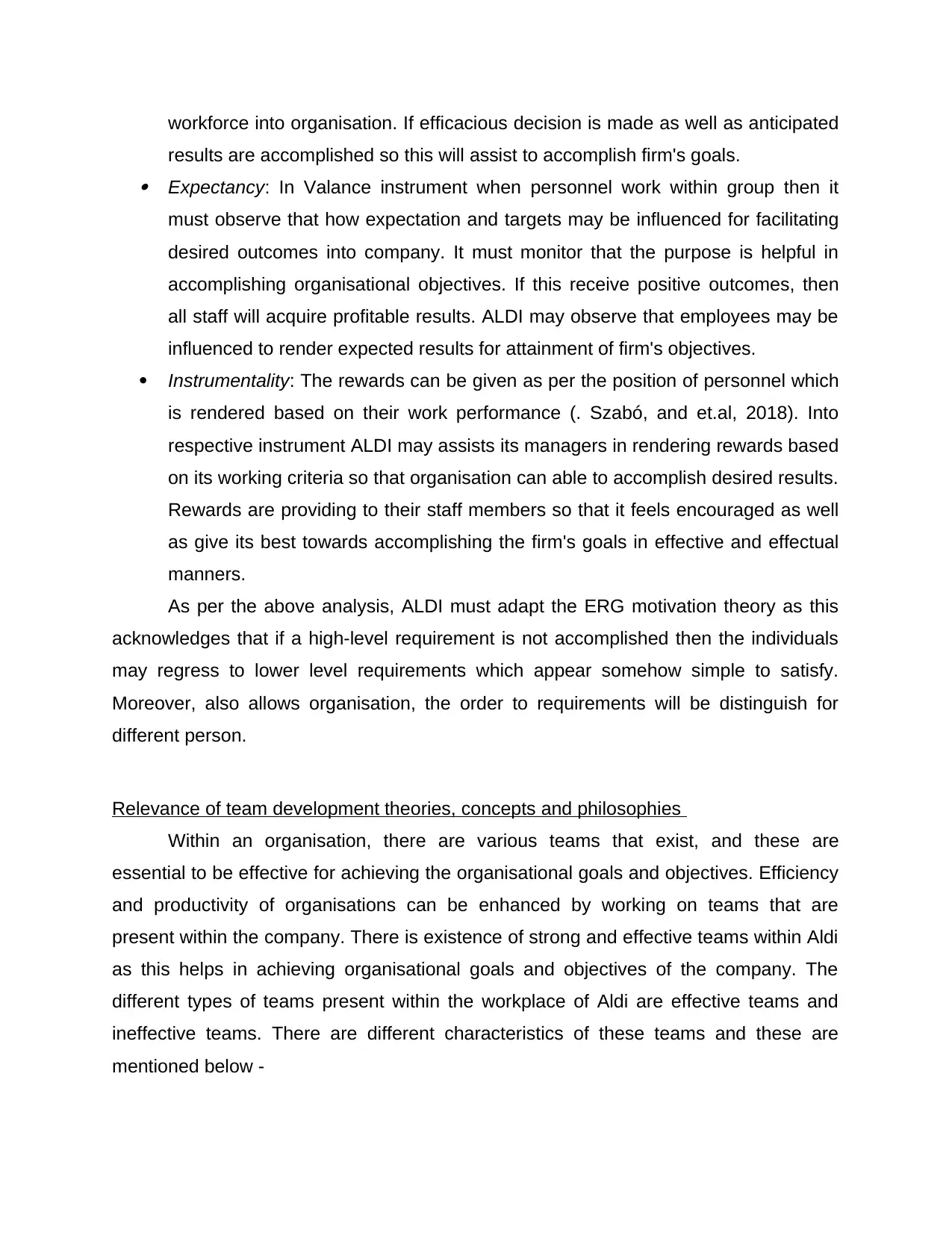
workforce into organisation. If efficacious decision is made as well as anticipated
results are accomplished so this will assist to accomplish firm's goals. Expectancy: In Valance instrument when personnel work within group then it
must observe that how expectation and targets may be influenced for facilitating
desired outcomes into company. It must monitor that the purpose is helpful in
accomplishing organisational objectives. If this receive positive outcomes, then
all staff will acquire profitable results. ALDI may observe that employees may be
influenced to render expected results for attainment of firm's objectives.
Instrumentality: The rewards can be given as per the position of personnel which
is rendered based on their work performance (. Szabó, and et.al, 2018). Into
respective instrument ALDI may assists its managers in rendering rewards based
on its working criteria so that organisation can able to accomplish desired results.
Rewards are providing to their staff members so that it feels encouraged as well
as give its best towards accomplishing the firm's goals in effective and effectual
manners.
As per the above analysis, ALDI must adapt the ERG motivation theory as this
acknowledges that if a high-level requirement is not accomplished then the individuals
may regress to lower level requirements which appear somehow simple to satisfy.
Moreover, also allows organisation, the order to requirements will be distinguish for
different person.
Relevance of team development theories, concepts and philosophies
Within an organisation, there are various teams that exist, and these are
essential to be effective for achieving the organisational goals and objectives. Efficiency
and productivity of organisations can be enhanced by working on teams that are
present within the company. There is existence of strong and effective teams within Aldi
as this helps in achieving organisational goals and objectives of the company. The
different types of teams present within the workplace of Aldi are effective teams and
ineffective teams. There are different characteristics of these teams and these are
mentioned below -
results are accomplished so this will assist to accomplish firm's goals. Expectancy: In Valance instrument when personnel work within group then it
must observe that how expectation and targets may be influenced for facilitating
desired outcomes into company. It must monitor that the purpose is helpful in
accomplishing organisational objectives. If this receive positive outcomes, then
all staff will acquire profitable results. ALDI may observe that employees may be
influenced to render expected results for attainment of firm's objectives.
Instrumentality: The rewards can be given as per the position of personnel which
is rendered based on their work performance (. Szabó, and et.al, 2018). Into
respective instrument ALDI may assists its managers in rendering rewards based
on its working criteria so that organisation can able to accomplish desired results.
Rewards are providing to their staff members so that it feels encouraged as well
as give its best towards accomplishing the firm's goals in effective and effectual
manners.
As per the above analysis, ALDI must adapt the ERG motivation theory as this
acknowledges that if a high-level requirement is not accomplished then the individuals
may regress to lower level requirements which appear somehow simple to satisfy.
Moreover, also allows organisation, the order to requirements will be distinguish for
different person.
Relevance of team development theories, concepts and philosophies
Within an organisation, there are various teams that exist, and these are
essential to be effective for achieving the organisational goals and objectives. Efficiency
and productivity of organisations can be enhanced by working on teams that are
present within the company. There is existence of strong and effective teams within Aldi
as this helps in achieving organisational goals and objectives of the company. The
different types of teams present within the workplace of Aldi are effective teams and
ineffective teams. There are different characteristics of these teams and these are
mentioned below -
Secure Best Marks with AI Grader
Need help grading? Try our AI Grader for instant feedback on your assignments.
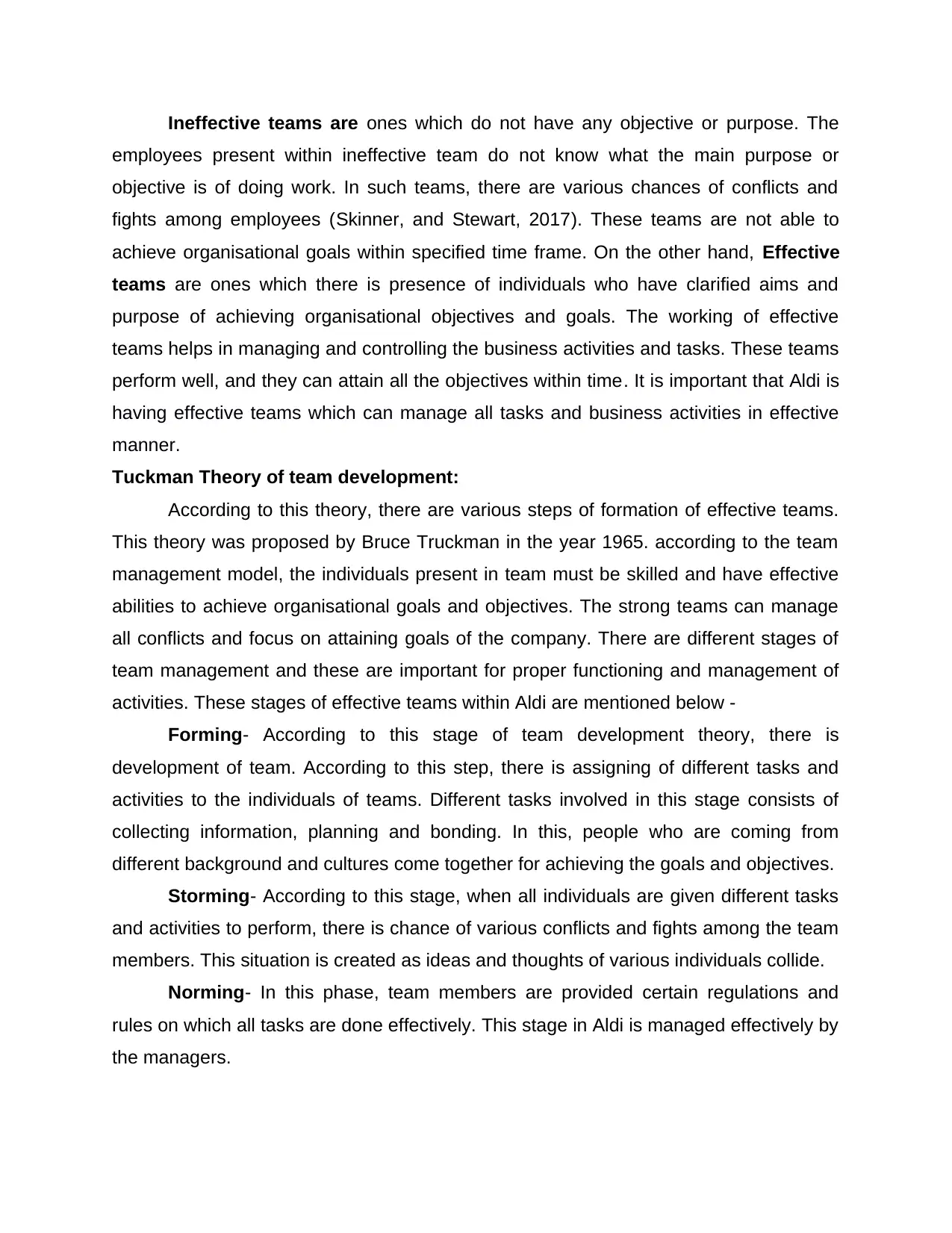
Ineffective teams are ones which do not have any objective or purpose. The
employees present within ineffective team do not know what the main purpose or
objective is of doing work. In such teams, there are various chances of conflicts and
fights among employees (Skinner, and Stewart, 2017). These teams are not able to
achieve organisational goals within specified time frame. On the other hand, Effective
teams are ones which there is presence of individuals who have clarified aims and
purpose of achieving organisational objectives and goals. The working of effective
teams helps in managing and controlling the business activities and tasks. These teams
perform well, and they can attain all the objectives within time. It is important that Aldi is
having effective teams which can manage all tasks and business activities in effective
manner.
Tuckman Theory of team development:
According to this theory, there are various steps of formation of effective teams.
This theory was proposed by Bruce Truckman in the year 1965. according to the team
management model, the individuals present in team must be skilled and have effective
abilities to achieve organisational goals and objectives. The strong teams can manage
all conflicts and focus on attaining goals of the company. There are different stages of
team management and these are important for proper functioning and management of
activities. These stages of effective teams within Aldi are mentioned below -
Forming- According to this stage of team development theory, there is
development of team. According to this step, there is assigning of different tasks and
activities to the individuals of teams. Different tasks involved in this stage consists of
collecting information, planning and bonding. In this, people who are coming from
different background and cultures come together for achieving the goals and objectives.
Storming- According to this stage, when all individuals are given different tasks
and activities to perform, there is chance of various conflicts and fights among the team
members. This situation is created as ideas and thoughts of various individuals collide.
Norming- In this phase, team members are provided certain regulations and
rules on which all tasks are done effectively. This stage in Aldi is managed effectively by
the managers.
employees present within ineffective team do not know what the main purpose or
objective is of doing work. In such teams, there are various chances of conflicts and
fights among employees (Skinner, and Stewart, 2017). These teams are not able to
achieve organisational goals within specified time frame. On the other hand, Effective
teams are ones which there is presence of individuals who have clarified aims and
purpose of achieving organisational objectives and goals. The working of effective
teams helps in managing and controlling the business activities and tasks. These teams
perform well, and they can attain all the objectives within time. It is important that Aldi is
having effective teams which can manage all tasks and business activities in effective
manner.
Tuckman Theory of team development:
According to this theory, there are various steps of formation of effective teams.
This theory was proposed by Bruce Truckman in the year 1965. according to the team
management model, the individuals present in team must be skilled and have effective
abilities to achieve organisational goals and objectives. The strong teams can manage
all conflicts and focus on attaining goals of the company. There are different stages of
team management and these are important for proper functioning and management of
activities. These stages of effective teams within Aldi are mentioned below -
Forming- According to this stage of team development theory, there is
development of team. According to this step, there is assigning of different tasks and
activities to the individuals of teams. Different tasks involved in this stage consists of
collecting information, planning and bonding. In this, people who are coming from
different background and cultures come together for achieving the goals and objectives.
Storming- According to this stage, when all individuals are given different tasks
and activities to perform, there is chance of various conflicts and fights among the team
members. This situation is created as ideas and thoughts of various individuals collide.
Norming- In this phase, team members are provided certain regulations and
rules on which all tasks are done effectively. This stage in Aldi is managed effectively by
the managers.
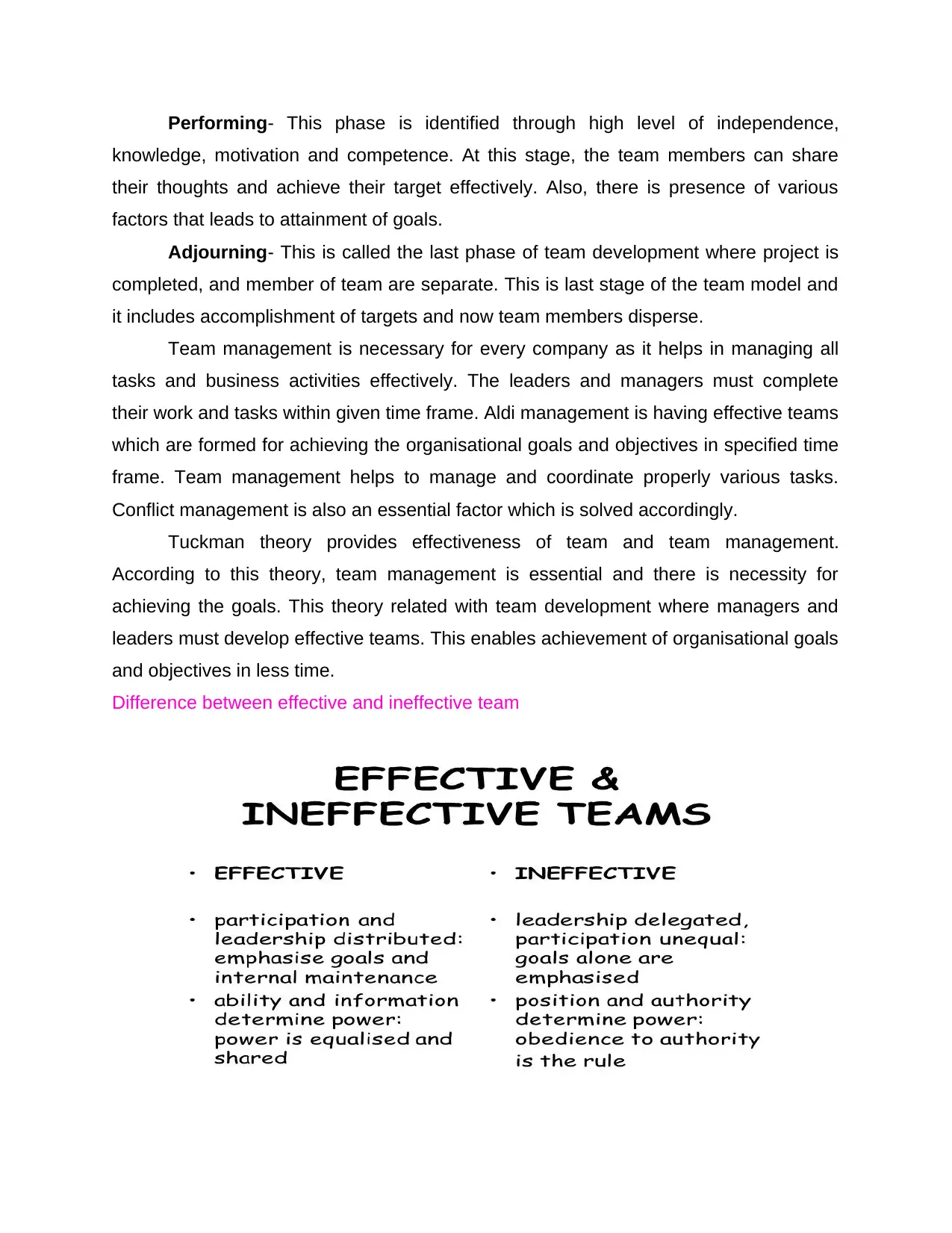
Performing- This phase is identified through high level of independence,
knowledge, motivation and competence. At this stage, the team members can share
their thoughts and achieve their target effectively. Also, there is presence of various
factors that leads to attainment of goals.
Adjourning- This is called the last phase of team development where project is
completed, and member of team are separate. This is last stage of the team model and
it includes accomplishment of targets and now team members disperse.
Team management is necessary for every company as it helps in managing all
tasks and business activities effectively. The leaders and managers must complete
their work and tasks within given time frame. Aldi management is having effective teams
which are formed for achieving the organisational goals and objectives in specified time
frame. Team management helps to manage and coordinate properly various tasks.
Conflict management is also an essential factor which is solved accordingly.
Tuckman theory provides effectiveness of team and team management.
According to this theory, team management is essential and there is necessity for
achieving the goals. This theory related with team development where managers and
leaders must develop effective teams. This enables achievement of organisational goals
and objectives in less time.
Difference between effective and ineffective team
knowledge, motivation and competence. At this stage, the team members can share
their thoughts and achieve their target effectively. Also, there is presence of various
factors that leads to attainment of goals.
Adjourning- This is called the last phase of team development where project is
completed, and member of team are separate. This is last stage of the team model and
it includes accomplishment of targets and now team members disperse.
Team management is necessary for every company as it helps in managing all
tasks and business activities effectively. The leaders and managers must complete
their work and tasks within given time frame. Aldi management is having effective teams
which are formed for achieving the organisational goals and objectives in specified time
frame. Team management helps to manage and coordinate properly various tasks.
Conflict management is also an essential factor which is solved accordingly.
Tuckman theory provides effectiveness of team and team management.
According to this theory, team management is essential and there is necessity for
achieving the goals. This theory related with team development where managers and
leaders must develop effective teams. This enables achievement of organisational goals
and objectives in less time.
Difference between effective and ineffective team
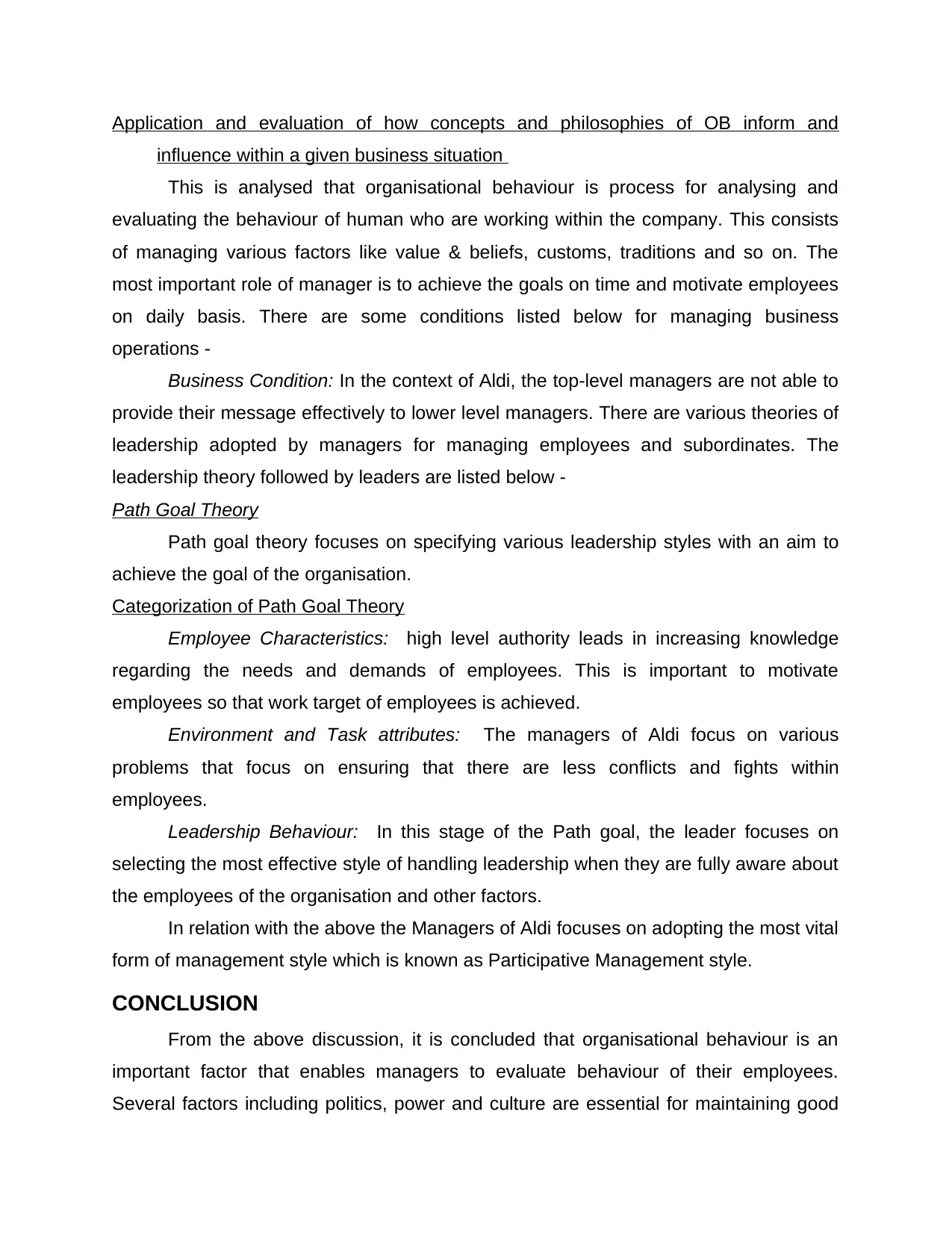
Application and evaluation of how concepts and philosophies of OB inform and
influence within a given business situation
This is analysed that organisational behaviour is process for analysing and
evaluating the behaviour of human who are working within the company. This consists
of managing various factors like value & beliefs, customs, traditions and so on. The
most important role of manager is to achieve the goals on time and motivate employees
on daily basis. There are some conditions listed below for managing business
operations -
Business Condition: In the context of Aldi, the top-level managers are not able to
provide their message effectively to lower level managers. There are various theories of
leadership adopted by managers for managing employees and subordinates. The
leadership theory followed by leaders are listed below -
Path Goal Theory
Path goal theory focuses on specifying various leadership styles with an aim to
achieve the goal of the organisation.
Categorization of Path Goal Theory
Employee Characteristics: high level authority leads in increasing knowledge
regarding the needs and demands of employees. This is important to motivate
employees so that work target of employees is achieved.
Environment and Task attributes: The managers of Aldi focus on various
problems that focus on ensuring that there are less conflicts and fights within
employees.
Leadership Behaviour: In this stage of the Path goal, the leader focuses on
selecting the most effective style of handling leadership when they are fully aware about
the employees of the organisation and other factors.
In relation with the above the Managers of Aldi focuses on adopting the most vital
form of management style which is known as Participative Management style.
CONCLUSION
From the above discussion, it is concluded that organisational behaviour is an
important factor that enables managers to evaluate behaviour of their employees.
Several factors including politics, power and culture are essential for maintaining good
influence within a given business situation
This is analysed that organisational behaviour is process for analysing and
evaluating the behaviour of human who are working within the company. This consists
of managing various factors like value & beliefs, customs, traditions and so on. The
most important role of manager is to achieve the goals on time and motivate employees
on daily basis. There are some conditions listed below for managing business
operations -
Business Condition: In the context of Aldi, the top-level managers are not able to
provide their message effectively to lower level managers. There are various theories of
leadership adopted by managers for managing employees and subordinates. The
leadership theory followed by leaders are listed below -
Path Goal Theory
Path goal theory focuses on specifying various leadership styles with an aim to
achieve the goal of the organisation.
Categorization of Path Goal Theory
Employee Characteristics: high level authority leads in increasing knowledge
regarding the needs and demands of employees. This is important to motivate
employees so that work target of employees is achieved.
Environment and Task attributes: The managers of Aldi focus on various
problems that focus on ensuring that there are less conflicts and fights within
employees.
Leadership Behaviour: In this stage of the Path goal, the leader focuses on
selecting the most effective style of handling leadership when they are fully aware about
the employees of the organisation and other factors.
In relation with the above the Managers of Aldi focuses on adopting the most vital
form of management style which is known as Participative Management style.
CONCLUSION
From the above discussion, it is concluded that organisational behaviour is an
important factor that enables managers to evaluate behaviour of their employees.
Several factors including politics, power and culture are essential for maintaining good
Paraphrase This Document
Need a fresh take? Get an instant paraphrase of this document with our AI Paraphraser
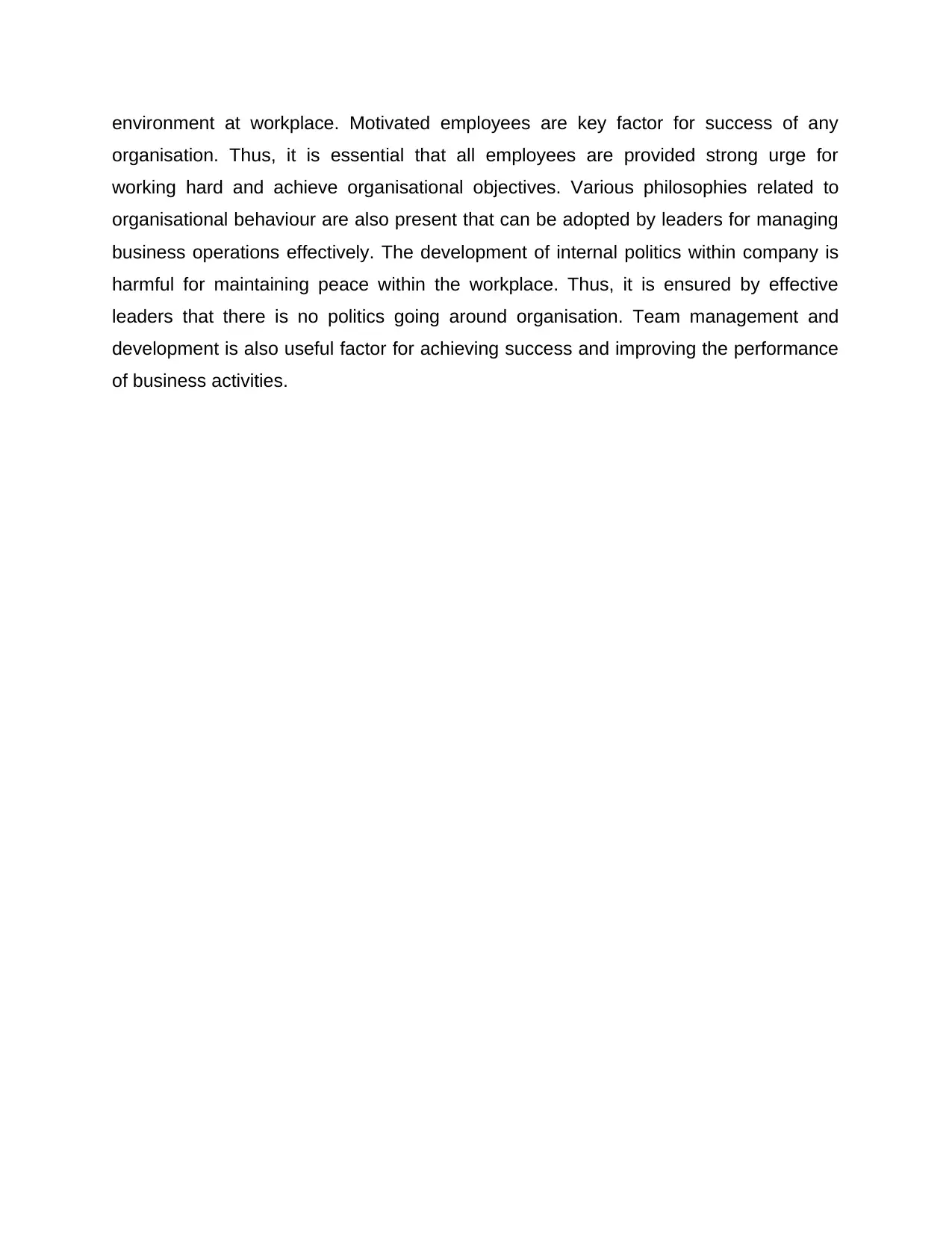
environment at workplace. Motivated employees are key factor for success of any
organisation. Thus, it is essential that all employees are provided strong urge for
working hard and achieve organisational objectives. Various philosophies related to
organisational behaviour are also present that can be adopted by leaders for managing
business operations effectively. The development of internal politics within company is
harmful for maintaining peace within the workplace. Thus, it is ensured by effective
leaders that there is no politics going around organisation. Team management and
development is also useful factor for achieving success and improving the performance
of business activities.
organisation. Thus, it is essential that all employees are provided strong urge for
working hard and achieve organisational objectives. Various philosophies related to
organisational behaviour are also present that can be adopted by leaders for managing
business operations effectively. The development of internal politics within company is
harmful for maintaining peace within the workplace. Thus, it is ensured by effective
leaders that there is no politics going around organisation. Team management and
development is also useful factor for achieving success and improving the performance
of business activities.
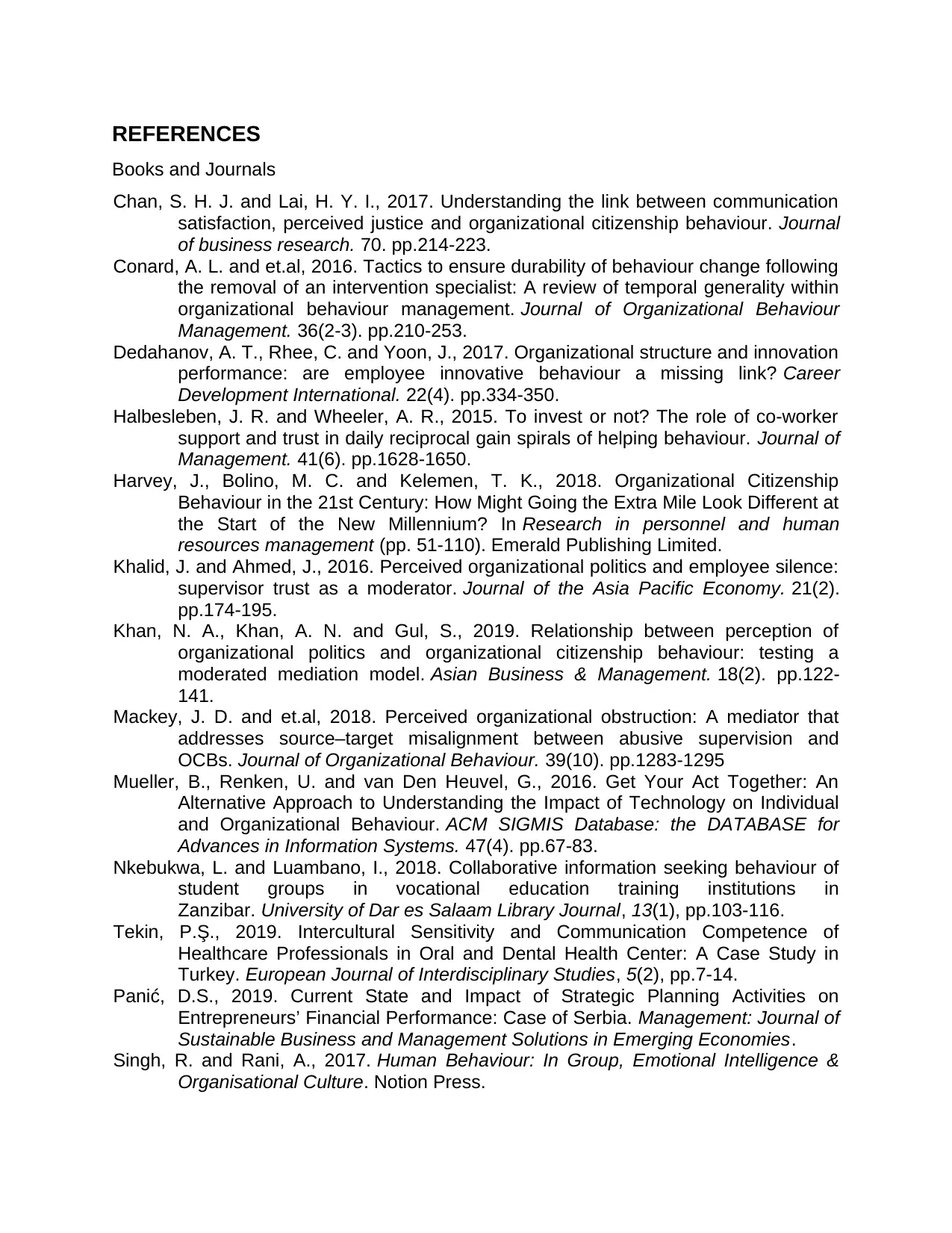
REFERENCES
Books and Journals
Chan, S. H. J. and Lai, H. Y. I., 2017. Understanding the link between communication
satisfaction, perceived justice and organizational citizenship behaviour. Journal
of business research. 70. pp.214-223.
Conard, A. L. and et.al, 2016. Tactics to ensure durability of behaviour change following
the removal of an intervention specialist: A review of temporal generality within
organizational behaviour management. Journal of Organizational Behaviour
Management. 36(2-3). pp.210-253.
Dedahanov, A. T., Rhee, C. and Yoon, J., 2017. Organizational structure and innovation
performance: are employee innovative behaviour a missing link? Career
Development International. 22(4). pp.334-350.
Halbesleben, J. R. and Wheeler, A. R., 2015. To invest or not? The role of co-worker
support and trust in daily reciprocal gain spirals of helping behaviour. Journal of
Management. 41(6). pp.1628-1650.
Harvey, J., Bolino, M. C. and Kelemen, T. K., 2018. Organizational Citizenship
Behaviour in the 21st Century: How Might Going the Extra Mile Look Different at
the Start of the New Millennium? In Research in personnel and human
resources management (pp. 51-110). Emerald Publishing Limited.
Khalid, J. and Ahmed, J., 2016. Perceived organizational politics and employee silence:
supervisor trust as a moderator. Journal of the Asia Pacific Economy. 21(2).
pp.174-195.
Khan, N. A., Khan, A. N. and Gul, S., 2019. Relationship between perception of
organizational politics and organizational citizenship behaviour: testing a
moderated mediation model. Asian Business & Management. 18(2). pp.122-
141.
Mackey, J. D. and et.al, 2018. Perceived organizational obstruction: A mediator that
addresses source–target misalignment between abusive supervision and
OCBs. Journal of Organizational Behaviour. 39(10). pp.1283-1295
Mueller, B., Renken, U. and van Den Heuvel, G., 2016. Get Your Act Together: An
Alternative Approach to Understanding the Impact of Technology on Individual
and Organizational Behaviour. ACM SIGMIS Database: the DATABASE for
Advances in Information Systems. 47(4). pp.67-83.
Nkebukwa, L. and Luambano, I., 2018. Collaborative information seeking behaviour of
student groups in vocational education training institutions in
Zanzibar. University of Dar es Salaam Library Journal, 13(1), pp.103-116.
Tekin, P.Ş., 2019. Intercultural Sensitivity and Communication Competence of
Healthcare Professionals in Oral and Dental Health Center: A Case Study in
Turkey. European Journal of Interdisciplinary Studies, 5(2), pp.7-14.
Panić, D.S., 2019. Current State and Impact of Strategic Planning Activities on
Entrepreneurs’ Financial Performance: Case of Serbia. Management: Journal of
Sustainable Business and Management Solutions in Emerging Economies.
Singh, R. and Rani, A., 2017. Human Behaviour: In Group, Emotional Intelligence &
Organisational Culture. Notion Press.
Books and Journals
Chan, S. H. J. and Lai, H. Y. I., 2017. Understanding the link between communication
satisfaction, perceived justice and organizational citizenship behaviour. Journal
of business research. 70. pp.214-223.
Conard, A. L. and et.al, 2016. Tactics to ensure durability of behaviour change following
the removal of an intervention specialist: A review of temporal generality within
organizational behaviour management. Journal of Organizational Behaviour
Management. 36(2-3). pp.210-253.
Dedahanov, A. T., Rhee, C. and Yoon, J., 2017. Organizational structure and innovation
performance: are employee innovative behaviour a missing link? Career
Development International. 22(4). pp.334-350.
Halbesleben, J. R. and Wheeler, A. R., 2015. To invest or not? The role of co-worker
support and trust in daily reciprocal gain spirals of helping behaviour. Journal of
Management. 41(6). pp.1628-1650.
Harvey, J., Bolino, M. C. and Kelemen, T. K., 2018. Organizational Citizenship
Behaviour in the 21st Century: How Might Going the Extra Mile Look Different at
the Start of the New Millennium? In Research in personnel and human
resources management (pp. 51-110). Emerald Publishing Limited.
Khalid, J. and Ahmed, J., 2016. Perceived organizational politics and employee silence:
supervisor trust as a moderator. Journal of the Asia Pacific Economy. 21(2).
pp.174-195.
Khan, N. A., Khan, A. N. and Gul, S., 2019. Relationship between perception of
organizational politics and organizational citizenship behaviour: testing a
moderated mediation model. Asian Business & Management. 18(2). pp.122-
141.
Mackey, J. D. and et.al, 2018. Perceived organizational obstruction: A mediator that
addresses source–target misalignment between abusive supervision and
OCBs. Journal of Organizational Behaviour. 39(10). pp.1283-1295
Mueller, B., Renken, U. and van Den Heuvel, G., 2016. Get Your Act Together: An
Alternative Approach to Understanding the Impact of Technology on Individual
and Organizational Behaviour. ACM SIGMIS Database: the DATABASE for
Advances in Information Systems. 47(4). pp.67-83.
Nkebukwa, L. and Luambano, I., 2018. Collaborative information seeking behaviour of
student groups in vocational education training institutions in
Zanzibar. University of Dar es Salaam Library Journal, 13(1), pp.103-116.
Tekin, P.Ş., 2019. Intercultural Sensitivity and Communication Competence of
Healthcare Professionals in Oral and Dental Health Center: A Case Study in
Turkey. European Journal of Interdisciplinary Studies, 5(2), pp.7-14.
Panić, D.S., 2019. Current State and Impact of Strategic Planning Activities on
Entrepreneurs’ Financial Performance: Case of Serbia. Management: Journal of
Sustainable Business and Management Solutions in Emerging Economies.
Singh, R. and Rani, A., 2017. Human Behaviour: In Group, Emotional Intelligence &
Organisational Culture. Notion Press.
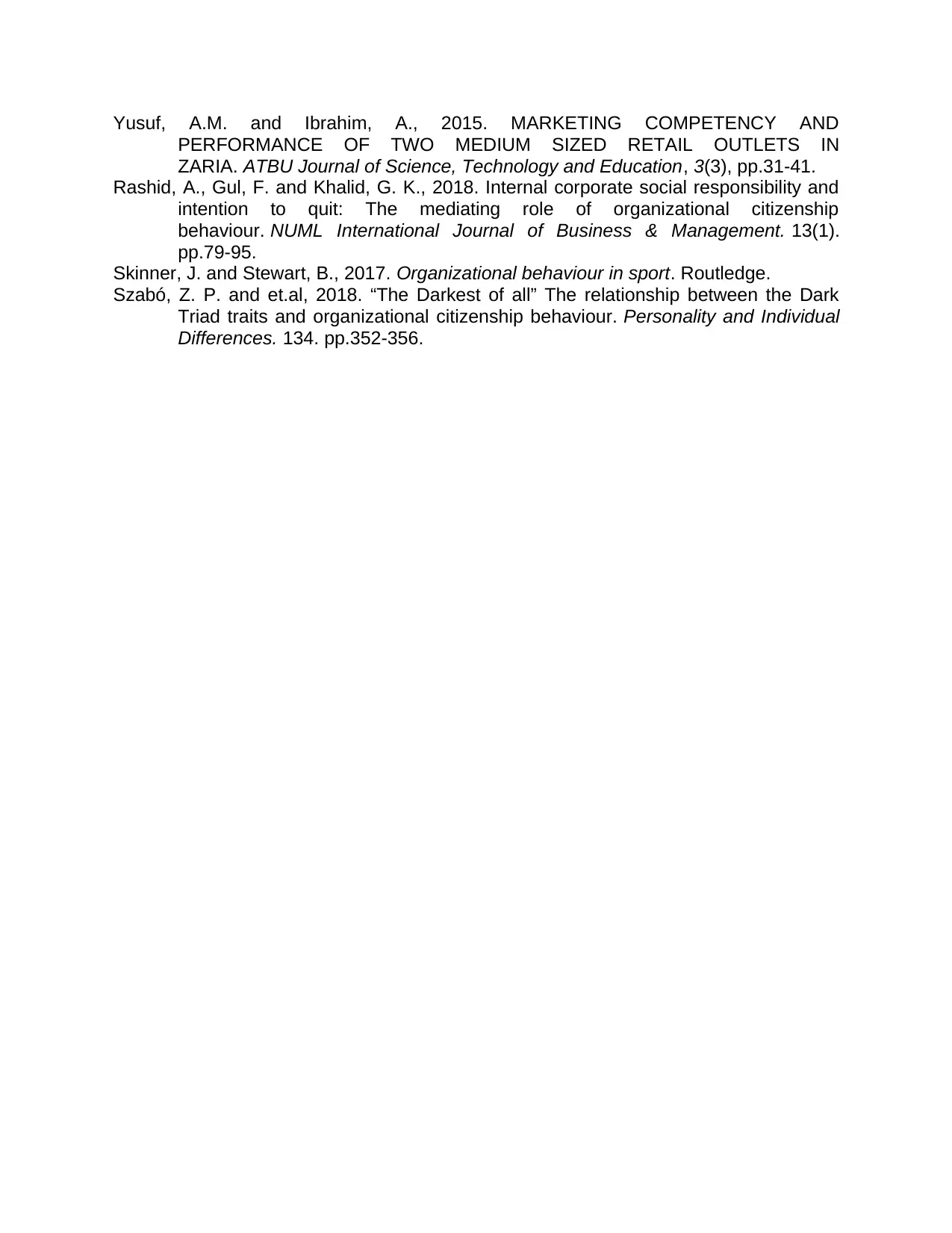
Yusuf, A.M. and Ibrahim, A., 2015. MARKETING COMPETENCY AND
PERFORMANCE OF TWO MEDIUM SIZED RETAIL OUTLETS IN
ZARIA. ATBU Journal of Science, Technology and Education, 3(3), pp.31-41.
Rashid, A., Gul, F. and Khalid, G. K., 2018. Internal corporate social responsibility and
intention to quit: The mediating role of organizational citizenship
behaviour. NUML International Journal of Business & Management. 13(1).
pp.79-95.
Skinner, J. and Stewart, B., 2017. Organizational behaviour in sport. Routledge.
Szabó, Z. P. and et.al, 2018. “The Darkest of all” The relationship between the Dark
Triad traits and organizational citizenship behaviour. Personality and Individual
Differences. 134. pp.352-356.
PERFORMANCE OF TWO MEDIUM SIZED RETAIL OUTLETS IN
ZARIA. ATBU Journal of Science, Technology and Education, 3(3), pp.31-41.
Rashid, A., Gul, F. and Khalid, G. K., 2018. Internal corporate social responsibility and
intention to quit: The mediating role of organizational citizenship
behaviour. NUML International Journal of Business & Management. 13(1).
pp.79-95.
Skinner, J. and Stewart, B., 2017. Organizational behaviour in sport. Routledge.
Szabó, Z. P. and et.al, 2018. “The Darkest of all” The relationship between the Dark
Triad traits and organizational citizenship behaviour. Personality and Individual
Differences. 134. pp.352-356.
1 out of 16
Related Documents
Your All-in-One AI-Powered Toolkit for Academic Success.
+13062052269
info@desklib.com
Available 24*7 on WhatsApp / Email
![[object Object]](/_next/static/media/star-bottom.7253800d.svg)
Unlock your academic potential
© 2024 | Zucol Services PVT LTD | All rights reserved.



